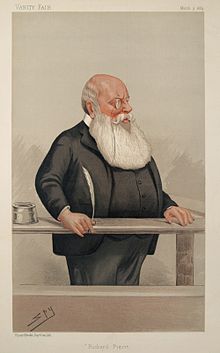Richard Piggott
| Richard Pigott | |
|---|---|

Pigott as caricatured by Spy (Leslie Ward) in Vanity Fair, March 1889
|
|
| Born | 1835 Ratoath, Co. Meath, Ireland |
| Died | 1 March 1889 (aged 53–54) Madrid, Spain |
| Cause of death | Suicide by shooting |
| Nationality | Irish |
| Citizenship | United Kingdom of Great Britain and Ireland |
| Occupation | Journalist |
| Known for | The 'Piggot Papers' forgery |
Richard Pigott (1835—1 March 1889) was an Irish journalist, best known for selling the Pigott forgeries.
Pigott was born in Ratoath, County Meath. As a young man he supported Irish nationalism and worked on the Nation and the Tablet before acting as manager of The Irishman, a newspaper founded by Denis Holland. James O'Connor later claimed Pigott embezzled funds from the paper (Holland, who had no business sense, left its affairs to Pigott) and covered his tracks by not keeping written records. Pigott also worked for the Land League, departing in 1883 after accusing its treasurer, Mr Fagan, of being unable to account for £100,000 of its funds (equivalent to £9,200,000 in 2016), and for keeping inadequate records. Nothing was done about his accusation, which was publicised in the newspapers, and he turned against the League, which was allied to several Irish nationalist groups including the Irish Parliamentary Party led by Charles Stewart Parnell.
In 1879 Pigott was proprietor of three newspapers, which he soon sold to the Irish Land League, of which Charles Stewart Parnell was president. Hitherto a violent Nationalist, from 1884 Pigott began to vilify his former associates and to sell information to their political opponents. In an effort to destroy Parnell's career, Pigott produced fake letters, which purported that Parnell had supported one of the Phoenix Park murders.
The Times bought Pigott's forgeries for £1,780 (equivalent to £182,000 in 2016) and published the most damning letter on 18 April 1887. Parnell immediately denounced it as "a villainous and barefaced forgery". In February 1889, the Parnell Commission vindicated him by proving that the letters were forgeries. They included misspellings (specifically 'hesitency [sic]') which Pigott had written elsewhere. A libel action instituted by Parnell also vindicated him, and his parliamentary career survived the Pigott accusations.
...
Wikipedia
